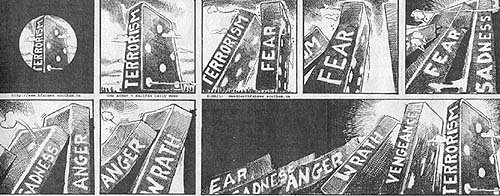

Losing our innocence:
A continent grows up the hardest way
Sept. 14, 2001
|
|
|
The
United States had its ego shattered, for better and for worse.
When my clock radio woke me to the news of the terrorist attacks
in New York and Washington, I felt the world had changed forever.
Surely, as Americans and Canadians, we could no longer lull
ourselves into a false sense of safety, order and peace. In
all the years I can remember, we have, like children, assumed
that nothing could hurt us, that within our borders we were
not only invulnerable but also immortal.
Yes,
there had been a few acts of terrorism; the FLQ in Quebec,
the previous attack on the World Trade Center and the Oklahoma
bombing, but these attacks seem relatively minor when compared
with this week's violence. Then, we were able to clean up
the debris, shed our tears, erect monuments to the victims,
and punish the perpetrators. Things could revert to the way
they were and we could go about our days believing we had
a firm grip on peace. As North
Americans, we have languished far too long in a naïve,
childish belief in our security. Like spoiled children, we
have basked in the delusion that we were better than others,
that we had all of the answers. We've felt entitled to tell
other countries how to handle their problems. With our vision
of a new world order, we've sought to spread a "culture
of peace" around the globe, offering up our plans, ignoring
the failures. The terrorist
attacks this week ended our childhood. They cracked the façade
of security and jolted us out of any illusion of superiority
and invincibility. We have joined the rest of the world, one
that already knows the effects of terrorism and how to live
in a less than peaceful world. While
the events were shocking -- and the mounting death toll will
be, in the words of New York Mayor Rudolph Giuliani, "more
than any of us can bear" -- what happened is not that
different from what is experienced in other parts of the world;
the IRA threat in England, the Basque violence in Spain, the
Israeli and Palestinian conflict in the Middle East, and so
on. In Peru, it's the Sandero Luminosa. I was in Lima once
on New Year's when, at midnight, just to remind everyone of
their destructive power, these anarchists blew up the power
lines and blackened the capitol. In Britain,
I have a physician friend who tries to deny the threat of
the IRA. He doesn't talk about it, but everyone knows he avoids
using the Underground for fear of a bombing. I keep in touch
with a psychiatric colleague in Israel. When I first met him,
he was arrogantly confident; when his neighbour was killed
by an Iraqi Scud missile, I saw him become a broken and humbled
man. People
who live with the constant threat of danger are forced to
let go of the notions that make us less than human. In most
parts of the world, people learn to live with the on-going
threat of danger. Children see people die. They lose their
innocence. They know that life isn't fair, that good people
die, bad people can survive and that war and peace are two
sides of the same coin. People
who live with terror are more wary and less secure and, at
the same time, they're often more human. While they may be
permanently scarred, they exhibit strength and resilience.
And they value life differently. Today,
as rescuers sort through the debris, it is difficult to imagine
that anything good can come out of such tragedy. It is hard
to ponder anything beyond revenge. But none of us can go back
to life as usual. The time has come to let go of the hopes
and dreams of our lost adolescence. We must come to terms
with the fact that life is not always about healing. Life leaves scars. When, as nations and as individuals, we accept them, we will have grown up -- like it or not.
|
tanadineen.com
@ Dr.Tana
Dineen
1998-2007
by
Dr. Tana Dineen, special columnist,
